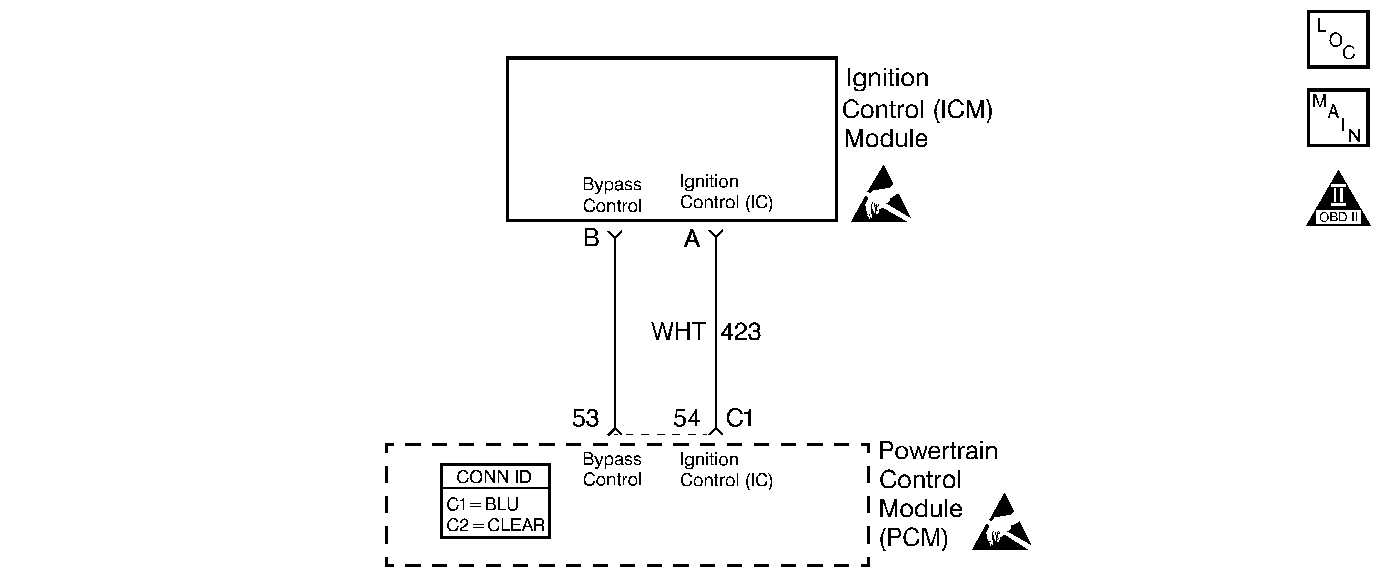
Circuit Description
The ignition control module (ICM) sends signals that the PCM requires for fuel control and spark advance calculations. At the start of engine crank, the ICM controls spark advance (Bypass mode). When the second 3X reference pulse is recognized by the PCM, the PCM applies 5 volts to the Bypass circuit. The 5 volts on the Bypass circuit commands the ICM to switch spark advance to PCM control (IC mode). At this time, The ICM will remove the ground it has applied to the IC circuit. When the IC pulses are not grounded, the PCM can use the IC pulses to control spark advance. A short in the IC circuit or an open or short to ground in the Bypass circuit will cause the PCM to monitor no IC pulses after the PCM has switched the Bypass circuit ON. The PCM will set DTC P1361 under either of these conditions. The engine may be started but will run on Bypass mode timing.
Conditions for Running the DTC
Engine is running.
Conditions for Setting the DTC
| • | The PCM does not monitor IC pulses while IC mode spark advance is commanded. |
| • | The conditions is present for 300 3X reference periods (100 crankshaft revolutions). |
Action Taken When the DTC Sets
| • | The PCM will illuminate the malfunction indicator lamp (MIL) during the second consecutive trip in which the diagnostic test has been run and failed. |
| • | The PCM will store conditions which were present when the DTC set as Freeze Frame/Failure Records data. |
Conditions for Clearing the MIL/DTC
| • | The PCM will turn OFF the malfunction indicator lamp (MIL) during the third consecutive trip in which the diagnostic has run and passed. |
| • | The history DTC will clear after 40 consecutive warm-up cycles have occurred without a malfunction. |
| • | The DTC can be cleared by using a scan tool. |
Diagnostic Aids
Inspect for the following:
Many situations may lead to an intermittent condition. Perform each inspection or test as directed.
Important: : Remove any debris from the connector surfaces before servicing a component. Inspect the connector gaskets when diagnosing or replacing a component. Ensure that the gaskets are installed correctly. The gaskets prevent contaminate intrusion.
| • | Loose terminal connection |
| - | Use a corresponding mating terminal to test for proper tension. Refer to Testing for Intermittent Conditions and Poor Connections , and to Connector Repairs in Wiring Systems for diagnosis and repair. |
| - | Inspect the harness connectors for backed out terminals, improper mating, broken locks, improperly formed or damaged terminals, and faulty terminal to wire connection. Refer to Testing for Intermittent Conditions and Poor Connections , and to Connector Repairs in Wiring Systems for diagnosis and repair. |
| • | Damaged harness--Inspect the wiring harness for damage. If the harness inspection does not reveal a problem, observe the display on the scan tool while moving connectors and wiring harnesses related to the sensor. A change in the scan tool display may indicate the location of the fault. Refer to Wiring Repairs in Wiring Systems for diagnosis and repair. |
| • | Inspect the powertrain control module (PCM) and the engine grounds for clean and secure connections. Refer to Wiring Repairs in Wiring Systems for diagnosis and repair. |
If the condition is determined to be intermittent, reviewing the Snapshot or Freeze Frame/Failure Records may be useful in determining when the DTC or condition was identified.
Test Description
Number(s) below refer to the step number(s) on the Diagnostic Table:
Step | Action | Values | Yes | No |
|---|---|---|---|---|
1 | Did you perform the Powertrain On-Board Diagnostic (OBD) System Check? | -- | ||
2 | Is DTC P1362 also set? | -- | ||
3 |
Does the test lamp illuminate? | -- | ||
4 |
Does the test lamp illuminate? | -- | ||
5 | Repair the short to voltage in the IC circuit. Refer to Wiring Repairs in Wiring Systems. Did you complete the repair? | -- | -- | |
6 |
Does the test lamp illuminate? | -- | ||
7 | Repair the short to ground in the IC circuit. Refer to Wiring Repairs in Wiring Systems. Did you complete the repair? | -- | -- | |
8 |
Does the test lamp illuminate? | -- | ||
9 | Repair the short to ground in the BYPASS circuit. Refer to Wiring Repairs in Wiring Systems. Did you complete the repair? | -- | -- | |
10 | Test for a short between the IC and the BYPASS circuits. Refer to Circuit Testing and Wiring Repairs in Wiring Systems. Did you find and correct the condition? | -- | ||
11 |
Does the voltage toggle between the specified ranges? | 20mV-40mV 150mV-250mV | ||
12 | Replace the ICM. Refer to Ignition Control Module Replacement . Did you complete the replacement? | -- | -- | |
|
Important:: The replacement PCM must be programmed. Replace the PCM. Refer to Powertrain Control Module Replacement/Programming . Did you complete the replacement? | -- | -- | ||
14 |
Does the DTC reset? | -- | System OK |
